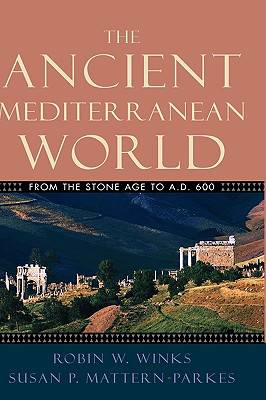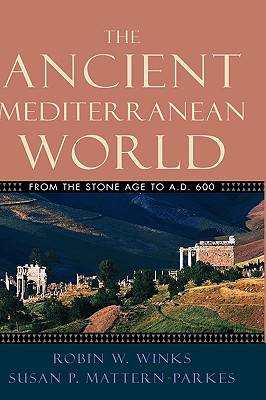
- Retrait gratuit dans votre magasin Club
- 7.000.000 titres dans notre catalogue
- Payer en toute sécurité
- Toujours un magasin près de chez vous
- Retrait gratuit dans votre magasin Club
- 7.000.0000 titres dans notre catalogue
- Payer en toute sécurité
- Toujours un magasin près de chez vous
The Ancient Mediterranean World
From the Stone Age to A.D. 600
Robin W Winks, Susan P Mattern-Parkes
Livre relié | Anglais
322,45 €
+ 644 points
Description
What is a city, and what forms did urbanization take in different times and places? How do peoples and nations define themselves and perceive foreigners? Questions like these serve as the framework for The Ancient Mediterranean World: From the Stone Age to A.D. 600. This book provides a concise overview of the history of the Mediterranean world, from Paleolithic times through the rise of Islam in the seventh century A.D. It traces the origins of the civilizations around the Mediterranean--including ancient Mesopotamia, Egypt, Israel, Greece, and Rome--and their interactions over time.
The Ancient Mediterranean World goes beyond political history to explore the lives of ordinary men and women and investigate topics such as the relationships between social classes, the dynamics of the family, the military and society, and aristocratic values. It introduces students not only to the ancient texts on which historians rely, but also to the art and architecture that reveal how people lived and how they understood ideas like love, death, and the body. Numerous illustrations, chronological charts, excerpts from ancient texts, and in-depth discussions of specific art objects and historical methods are included. Text boxes containing primary source materials examine such diverse subjects as warfare in early Mesopotamia, sculpting the body in classical Greece, the young women of Sappho's chorus, and early descriptions of the Huns. Combining excellent chronological coverage with a clear, concise narrative, The Ancient Mediterranean World is an ideal text for undergraduate courses in ancient history and ancient civilization.
The Ancient Mediterranean World goes beyond political history to explore the lives of ordinary men and women and investigate topics such as the relationships between social classes, the dynamics of the family, the military and society, and aristocratic values. It introduces students not only to the ancient texts on which historians rely, but also to the art and architecture that reveal how people lived and how they understood ideas like love, death, and the body. Numerous illustrations, chronological charts, excerpts from ancient texts, and in-depth discussions of specific art objects and historical methods are included. Text boxes containing primary source materials examine such diverse subjects as warfare in early Mesopotamia, sculpting the body in classical Greece, the young women of Sappho's chorus, and early descriptions of the Huns. Combining excellent chronological coverage with a clear, concise narrative, The Ancient Mediterranean World is an ideal text for undergraduate courses in ancient history and ancient civilization.
Spécifications
Parties prenantes
- Auteur(s) :
- Editeur:
Contenu
- Nombre de pages :
- 272
- Langue:
- Anglais
Caractéristiques
- EAN:
- 9780195155624
- Date de parution :
- 26-02-04
- Format:
- Livre relié
- Format numérique:
- Genaaid
- Dimensions :
- 164 mm x 240 mm
- Poids :
- 530 g

Les avis
Nous publions uniquement les avis qui respectent les conditions requises. Consultez nos conditions pour les avis.






